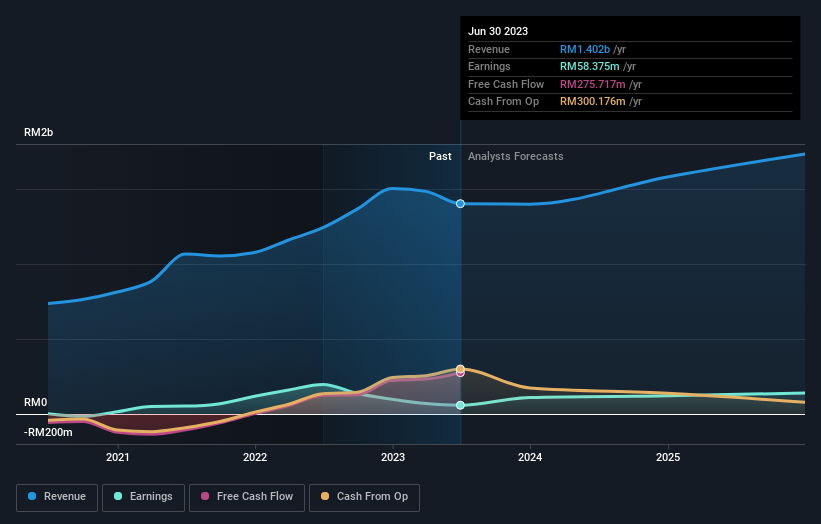Private companies account for 53% of Malaysia Smelting Corporation Berhad's (KLSE:MSC) ownership, while individual investors account for 35%
Key Insights
The considerable ownership by private companies in Malaysia Smelting Corporation Berhad indicates that they collectively have a greater say in management and business strategy
The largest shareholder of the company is Tan Chin Tuan Pte Ltd with a 52% stake
Ownership research, combined with past performance data can help provide a good understanding of opportunities in a stock
If you want to know who really controls Malaysia Smelting Corporation Berhad (KLSE:MSC), then you'll have to look at the makeup of its share registry. And the group that holds the biggest piece of the pie are private companies with 53% ownership. Put another way, the group faces the maximum upside potential (or downside risk).
Meanwhile, individual investors make up 35% of the company’s shareholders.
Let's delve deeper into each type of owner of Malaysia Smelting Corporation Berhad, beginning with the chart below.
See our latest analysis for Malaysia Smelting Corporation Berhad
What Does The Institutional Ownership Tell Us About Malaysia Smelting Corporation Berhad?
Many institutions measure their performance against an index that approximates the local market. So they usually pay more attention to companies that are included in major indices.
Since institutions own only a small portion of Malaysia Smelting Corporation Berhad, many may not have spent much time considering the stock. But it's clear that some have; and they liked it enough to buy in. If the business gets stronger from here, we could see a situation where more institutions are keen to buy. It is not uncommon to see a big share price rise if multiple institutional investors are trying to buy into a stock at the same time. So check out the historic earnings trajectory, below, but keep in mind it's the future that counts most.
We note that hedge funds don't have a meaningful investment in Malaysia Smelting Corporation Berhad. The company's largest shareholder is Tan Chin Tuan Pte Ltd, with ownership of 52%. With such a huge stake in the ownership, we infer that they have significant control of the future of the company. In comparison, the second and third largest shareholders hold about 1.3% and 0.9% of the stock.
While studying institutional ownership for a company can add value to your research, it is also a good practice to research analyst recommendations to get a deeper understand of a stock's expected performance. There is some analyst coverage of the stock, but it could still become more well known, with time.
Insider Ownership Of Malaysia Smelting Corporation Berhad
The definition of company insiders can be subjective and does vary between jurisdictions. Our data reflects individual insiders, capturing board members at the very least. Company management run the business, but the CEO will answer to the board, even if he or she is a member of it.
Most consider insider ownership a positive because it can indicate the board is well aligned with other shareholders. However, on some occasions too much power is concentrated within this group.
We can report that insiders do own shares in Malaysia Smelting Corporation Berhad. As individuals, the insiders collectively own RM66m worth of the RM895m company. It is good to see some investment by insiders, but we usually like to see higher insider holdings. It might be worth checking if those insiders have been buying.
General Public Ownership
The general public, who are usually individual investors, hold a 35% stake in Malaysia Smelting Corporation Berhad. This size of ownership, while considerable, may not be enough to change company policy if the decision is not in sync with other large shareholders.
Private Company Ownership
We can see that Private Companies own 53%, of the shares on issue. Private companies may be related parties. Sometimes insiders have an interest in a public company through a holding in a private company, rather than in their own capacity as an individual. While it's hard to draw any broad stroke conclusions, it is worth noting as an area for further research.
Next Steps:
I find it very interesting to look at who exactly owns a company. But to truly gain insight, we need to consider other information, too. Case in point: We've spotted 2 warning signs for Malaysia Smelting Corporation Berhad you should be aware of.
But ultimately it is the future, not the past, that will determine how well the owners of this business will do. Therefore we think it advisable to take a look at this free report showing whether analysts are predicting a brighter future.
NB: Figures in this article are calculated using data from the last twelve months, which refer to the 12-month period ending on the last date of the month the financial statement is dated. This may not be consistent with full year annual report figures.
Have feedback on this article? Concerned about the content? Get in touch with us directly. Alternatively, email editorial-team (at) simplywallst.com.
This article by Simply Wall St is general in nature. We provide commentary based on historical data and analyst forecasts only using an unbiased methodology and our articles are not intended to be financial advice. It does not constitute a recommendation to buy or sell any stock, and does not take account of your objectives, or your financial situation. We aim to bring you long-term focused analysis driven by fundamental data. Note that our analysis may not factor in the latest price-sensitive company announcements or qualitative material. Simply Wall St has no position in any stocks mentioned.

 Yahoo Finance
Yahoo Finance 

